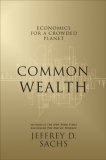
Critics' Opinion:
Readers' rating:
Published Mar 2008
400 pages
Genre: History, Current Affairs and Religion
Publication Information
The global economic system now faces a sustainability crisis, Jeffrey Sachs argues, that will overturn many of our basic assumptions about economic life. The changes will be deeper than a rebalancing of economics and politics among different parts of the world; the very idea of competing nation-states scrambling for power, resources, and markets will, in some crucial respects, become passe. The only question is how bad it will have to get before we face the unavoidable. We will have to learn on a global scale some of the hard lessons that successful societies have gradually and grudgingly learned within national borders: that there must be common ground between rich and poor, among competing ethnic groups, and between society and nature ...
If we do the right things, there is room for all on the planet. We can achieve the four key goals of a global society: prosperity for all, the end of extreme poverty, stabilization of the global population, and environmental sustainability. These are not utopian goals or pipe dreams, yet they are far from automatic. Indeed, we are not on a successful trajectory now to achieve these goals. Common Wealth points the way to the course correction we must embrace for the sake of our common future.
"A welcome contribution to the sustainable-development literature, accessible to nonspecialist readers but most useful to those with grounding in economics and international policy." - Kirkus Reviews.
"Common Wealth explains the most basic economic reckoning that the world faces. We can address poverty, climate change, and environmental destruction at a very modest cost today with huge benefits for shared and sustainable prosperity and peace in the future, or we can duck the issues today and risk a potentially costly reckoning in later years. Despite the rearguard opposition of some vested interests, policies to help the world's poor and the global environment are in fact the very best economic bargains on the planet." - Al Gore.
"Combining trenchant analysis with a resounding call to arms, Sachs's book is an important contribution to the debate over the world's future." - Publishers Weekly.
"Jeffrey Sachs never disappoints. With powerful illustrations and moving words, he describes what humanity must do if we are to share a common future on this planet. By making sense of economics as it affects the lives of people, this book is an excellent resource for all those who want to understand what changes the 21st century may bring." - Kofi Annan, winner of the 2001 Nobel Peace Prize and former secretary-general of the United Nations.
This information about Common Wealth was first featured
in "The BookBrowse Review" - BookBrowse's membership magazine, and in our weekly "Publishing This Week" newsletter. Publication information is for the USA, and (unless stated otherwise) represents the first print edition. The reviews are necessarily limited to those that were available to us ahead of publication. If you are the publisher or author and feel that they do not properly reflect the range of media opinion now available, send us a message with the mainstream reviews that you would like to see added.
Any "Author Information" displayed below reflects the author's biography at the time this particular book was published.
Jeffrey D. Sachs is director of the Earth Institute at Columbia University and special adviser to former UN Secretary-General Kofi Annan on the Millennium Development Goals. He is also the author of The New York Times bestseller, The End of Poverty.





The Flower Sisters
by Michelle Collins Anderson
From the new Fannie Flagg of the Ozarks, a richly-woven story of family, forgiveness, and reinvention.

The House on Biscayne Bay
by Chanel Cleeton
As death stalks a gothic mansion in Miami, the lives of two women intertwine as the past and present collide.

The Funeral Cryer by Wenyan Lu
Debut novelist Wenyan Lu brings us this witty yet profound story about one woman's midlife reawakening in contemporary rural China.
Your guide toexceptional books
BookBrowse seeks out and recommends the best in contemporary fiction and nonfiction—books that not only engage and entertain but also deepen our understanding of ourselves and the world around us.